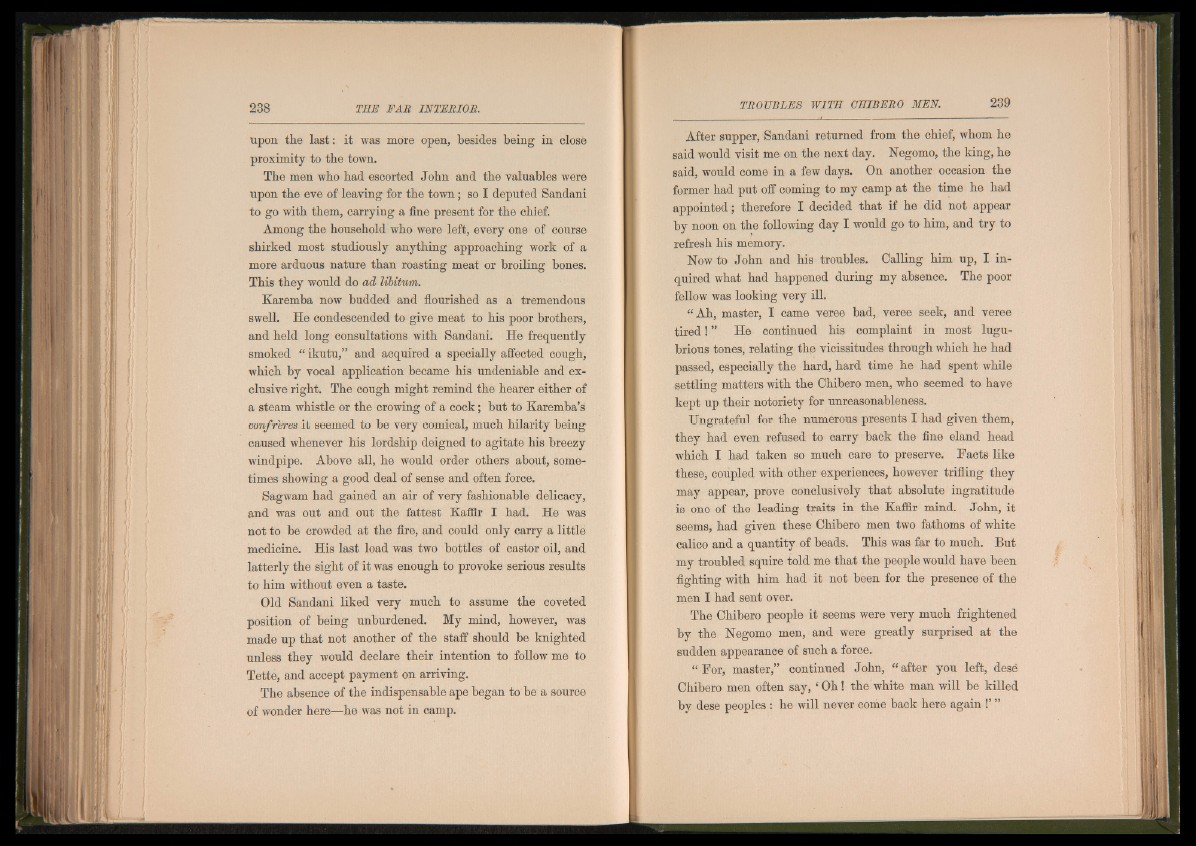
upon the last: it was more open, besides being in close
proximity to tbe town.
The men who had escorted John and the valuables were
upon the eve of leaving for the town; so I deputed Sandani
to go with them, carrying a fine present for the chief.
Among the household who were left, every one of course
shirked most studiously anything approaching work of a
more arduous nature than roasting meat or broiling bones.
This they would do ad libitum.
Karemba now budded and flourished as a tremendous
swell. He condescended to give meat to his poor brothers,
and held long consultations with Sandani. He frequently
smoked “ ikutu,” and acquired a specially affected cough,
which by vocal application became his undeniable and exclusive
right. The cough might remind the hearer either of
a steam whistle or the crowing of a cock; but to Karemba’s
confreres it seemed to be very comical, much hilarity being
caused whenever his lordship deigned to agitate his breezy
windpipe. Above all, he would order others about, sometimes
showing a good deal of sense and often force.
Sagwam had gained an air of very fashionable delicacy,
and was out and out the fattest Kaffir I had. He was
not to be crowded at the fire, and could only carry a little
medicine. His last load was two bottles of castor oil, and
latterly the sight of it was enough to provoke serious results
to him without even a taste.
Old Sandani liked very much to assume the coveted
position of being unburdened. My mind, however, was
made up that not another of the staff should be knighted
n n l o s s they would declare their intention to follow me to
Tette, and accept payment on arriving.
The absence of the indispensable ape began to be a source
of wonder here—he was not in camp.
After supper, Sandani returned from the chief, whom he
said would visit me on the next day. Negomo, the king, he
said, would come in a few days. On another occasion the
former had put off coming to my camp at the time he had
appointed; therefore I decided that if he did not appear
by noon on the following day I would go to him, and try to
refresh his memory.
Now to John and his troubles. Calling him up, I inquired
what had happened during my absence. The poor
fellow was looking very ill.
“ Ah, master, I came veree bad, veree seek, and veree
tired ! H He continued his complaint in most lugubrious
tones, relating the vicissitudes through which he had
passed, especially the hard, hard time he had spent while
settling matters with the Chibero men, who seemed to have
kept up their notoriety for unreasonableness.
Ungrateful for the numerous presents I had given them,
they had even refused to carry back the fine eland head
which I had taken so much care to preserve. Facts like
these, coupled with other experiences, however trifling they
may appear, prove conclusively that absolute ingratitude
is one of the leading traits in the Kaffir mind. John, it
seems, had given these Chibero men two fathoms of white
calico and a quantity of beads. This was far to much. But
my troubled squire told me that the people would have been
fighting with him had it not been for the presence of the
men I had sent over.
The Chibero people it seems were very much frightened
by the Negomo men, and were greatly surprised at the
sudden appearance of such a force.
“ For, master,” continued John, “ after you left, dese
Chibero men often say, ‘Oh! the white man will be killed
by dese peoples: he will never come back here again !’ ”